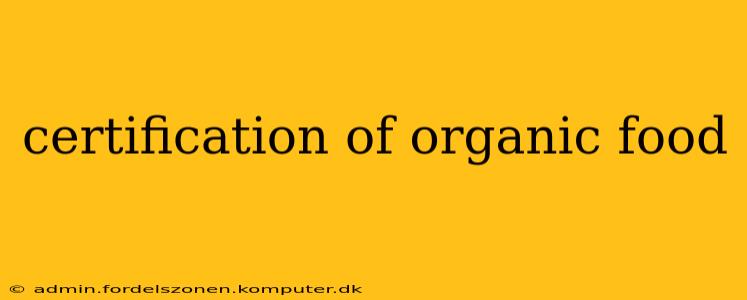Organic food is a booming market, driven by consumer demand for healthier, more sustainably produced food. But navigating the world of organic certifications can be confusing. This comprehensive guide will demystify the process, explaining what organic certification means, the different standards around the globe, and how to confidently choose certified organic products.
What Does Organic Certification Mean?
Organic certification signifies that a food product has been produced according to strict guidelines that minimize the use of synthetic pesticides, herbicides, fertilizers, genetically modified organisms (GMOs), and antibiotics. These guidelines vary slightly depending on the certifying body and the country of origin, but the core principles remain consistent: promoting biodiversity, protecting natural resources, and supporting animal welfare. The certification process involves rigorous inspections and audits to ensure compliance with these standards. It’s not just about the final product; it encompasses the entire production process, from seed to shelf.
How is Organic Food Certified?
The process typically involves these steps:
- Application: Farmers or producers apply to a certifying agency, providing detailed information about their farming practices.
- On-site Inspection: A certified inspector visits the farm or production facility to verify the information provided in the application and assess compliance with organic standards.
- Documentation Review: The certifying agency reviews all documentation, including production records, and verifies the farm's adherence to the standards.
- Certification: If the farm or production facility meets all the requirements, the agency grants certification. This typically involves regular inspections to maintain compliance.
- Labeling: Certified organic products can display the certifying agency's logo on the packaging, along with other relevant information.
What are the Different Organic Certification Standards?
The standards for organic certification vary across countries and regions. While the core principles are similar, the specific regulations and allowed practices can differ. Some of the most prominent certification bodies include:
- USDA Organic (United States): This is the most widely recognized organic certification in the U.S., administered by the United States Department of Agriculture.
- EU Organic (European Union): The EU has its own set of regulations for organic farming, ensuring high standards across its member states.
- JAS Organic (Japan): Japan's Agricultural Standard (JAS) sets stringent criteria for organic products.
- Organic Farmers Association (OFA): In many countries, independent organizations like the OFA oversee their own certifications, upholding the principles of sustainable organic farming.
These are just a few examples; many other national and regional certification bodies exist worldwide. The differences can be subtle but important, particularly regarding allowed practices and permitted inputs.
What are the Benefits of Choosing Certified Organic Food?
Consumers choose certified organic food for various reasons, including:
- Health benefits: Reduced exposure to synthetic pesticides and herbicides.
- Environmental benefits: Sustainable farming practices that protect biodiversity and soil health.
- Animal welfare: Higher standards of animal care in organic livestock production.
- Support for sustainable agriculture: By buying certified organic, you're supporting farmers who are committed to environmentally and socially responsible practices.
What Does the Organic Label Really Mean? Can I Trust It?
The organic label offers a guarantee that the food has been produced according to a specific set of standards. However, it's crucial to understand that the label doesn't guarantee perfection. Even with certification, there can be variations in farming practices and product quality. Looking for certifications from reputable organizations and checking the origin of the product can help ensure trustworthiness.
What is the Difference Between "Organic" and "Naturally Grown"?
The terms "organic" and "naturally grown" are often used interchangeably, but they are not the same. "Organic" refers to products certified under strict regulations, while "naturally grown" is a much less regulated term with no standardized definition. Products labeled "naturally grown" may not adhere to the same rigorous standards as certified organic products.
How Can I Identify a Genuine Organic Certificate?
Genuine organic certificates will be issued by accredited organizations and will usually include:
- The certifying agency's logo.
- The certification number.
- The date of certification.
- Details about the certified product.
Always be wary of certificates that lack these details or appear dubious.
How Can I Find More Information About Organic Certification in My Country?
For specific information on organic certification standards and regulations in your country, you should consult your national agricultural department or a relevant organic certification body. They can provide detailed information and resources.
By understanding the nuances of organic certification, consumers can make informed choices that align with their values and support sustainable food systems. Remember to always look for reputable certifications and don't hesitate to ask questions if you're unsure about a product's organic status.
